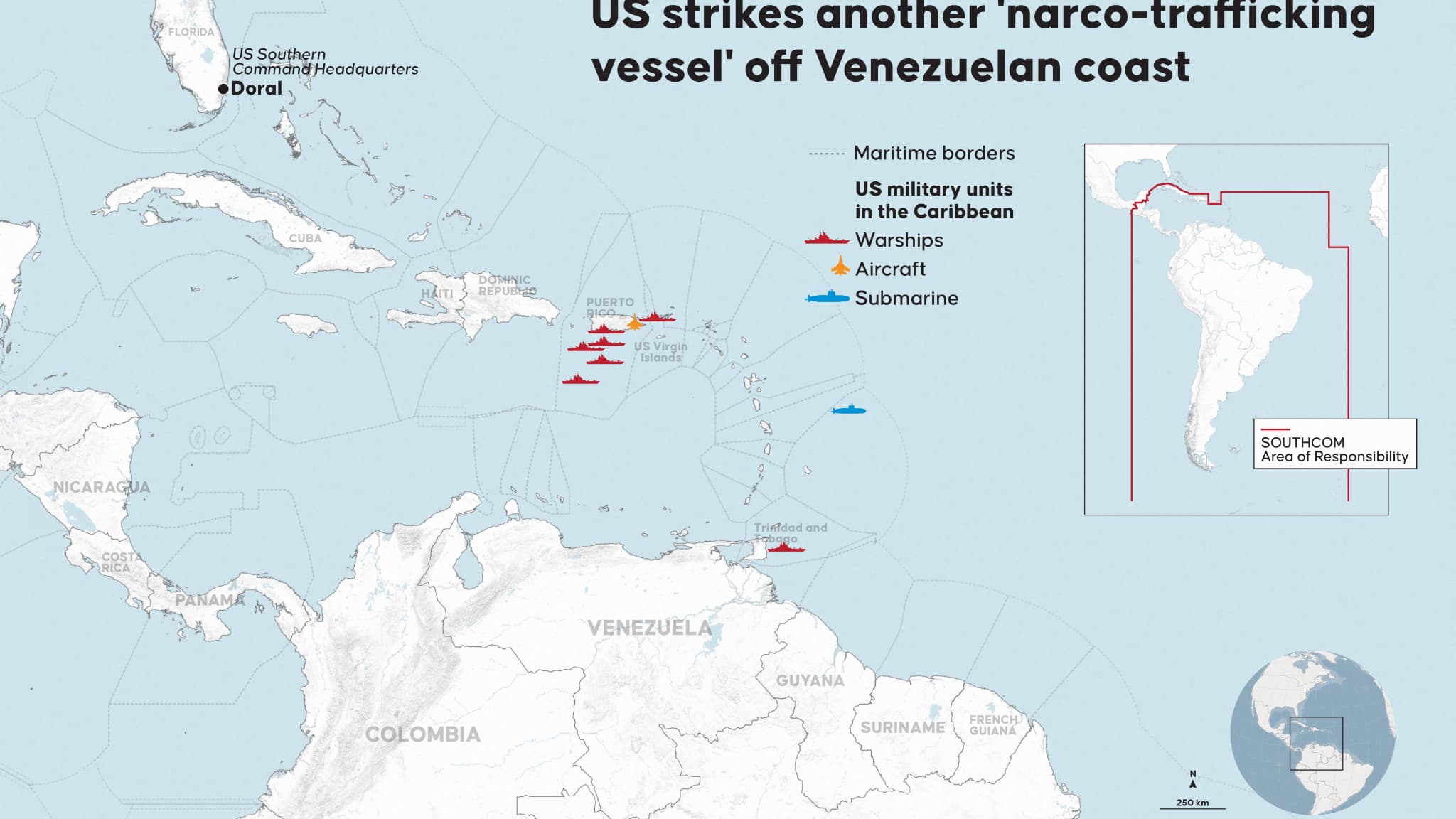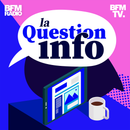Donald Trump on crusade against international drug trafficking. The American president declared war on the drug cartels and ordered the army to deploy at sea to fight against traffickers and thus “protect the national territory.” In recent weeks, US strikes have killed more than 60 people presented as members of criminal organizations.
Accused of fueling this trafficking, Venezuelan President Nicolás Maduro is officially wanted by US justice. He denounces a pretext “to impose a change of regime” and seize the country’s oil reserves.
· Fifteen deadly attacks
Since the beginning of September, the United States has been carrying out air attacks in the Pacific and especially in the Caribbean against ships that it presents as belonging to drug traffickers. To do this, Washington has deployed a fleet of eight warships in the Caribbean and F-35 fighter jets in Puerto Rico. Donald Trump also announced the upcoming arrival of the Gerald R. Ford aircraft carrier, the largest in the world.
In total, the Trump administration has claimed responsibility for 15 attacks in recent weeks, in which 62 people have died, according to it, without providing evidence of links between these people and drug trafficking.
“I think we’re just going to kill the people who bring drugs into our country, okay?” Donald Trump said on Friday, October 24, comparing drug cartels to terrorists.
On his social networks, the Secretary of Defense, Pete Hegseth – who is now called Secretary of War – spreads images of the interventions of the US army. “If you are a narcoterrorist who traffics drugs in our hemisphere, we will treat you like we treat Al Qaeda,” he warns in one of his publications.
Colombian President Gustavo Petro recently denounced the “murder” of a Colombian fisherman, killed according to him in a US attack, and accused the United States of having violated Colombian maritime space. Following these statements, Donald Trump called Gustavo Petro a “drug kingpin” and announced the end of US financial aid paid to Bogotá.
The UN High Commissioner for Human Rights, Volker Türk, denounced this Friday, October 31, “extrajudicial executions.” Remember that the fight against drug trafficking is “a matter of maintaining order” and that “according to international human rights law, the intentional use of lethal force is only authorized as a last resort against people who represent an imminent threat to life.”
· Price of the head of Nicolás Maduro
For Donald Trump, the person responsible for this international drug trafficking is obvious: Nicolás Maduro. The Venezuelan president is, like his predecessor Hugo Chávez, a declared enemy of the United States, whose “imperialism” he denounces.
During his first term (2017-2021), Donald Trump followed a policy of maximum sanctions against Venezuela, ordering an oil embargo. In 2020, Nicolás Maduro was charged with “narcoterrorism,” accused of “flooding the U.S. market with cocaine.”
According to the file issued by the US Secretary of State, President Maduro is the head of a drug trafficking network in which senior Venezuelan officials participate, called the “Cartel of the Suns”, an organization whose very existence is questioned by some specialists.
Since Donald Trump’s return to power, relations between Caracas and Washington have deteriorated further, while the United States does not recognize the controversial reelection of Nicolás Maduro in 2024. Last August, the Trump administration announced that it had doubled to $50 million (about 43 million euros) the reward for the arrest of the Venezuelan president.
· CIA authorized to carry out operations in Venezuela
US President Donald Trump admitted in mid-October to having authorized clandestine CIA actions against Venezuela, without giving more details. While a journalist asked him if he had given authorization to the US agency to “neutralize” Nicolás Maduro, Donald Trump dismissed a “ridiculous question.”
“We have never seen a president talk about clandestine CIA operations while they are being carried out. This clearly shows that we are in a story that must be staged,” explains researcher Jérome Viala-Gaudefroy, doctor in American civilization and professor at Sciences-Po, to BFMTV.
Venezuelan authorities immediately announced that they had dismantled a CIA cell that would have aimed to attack a US ship docked in Trinidad and Tobago, the USS Gravely, to create a “false flag” incident attributing it to Venezuela.
Donald Trump’s announcement has awakened memories in South America of coups d’état supported or orchestrated by the US secret services in the second half of the 20th century in Brazil, Chile and Guatemala.
If he ever brandished the threat of a “ground operation,” Donald Trump this Friday ruled out any plan for a direct attack against Venezuela.
· Drug trafficking, a pretext?
If Donald Trump accuses Nicolás Maduro of leading a “narcoterrorist” regime, specialists do not consider Venezuela to be a key country for drug trafficking in Latin America.
“Venezuela is not a drug-producing country” like Bolivia or Colombia, says Thomas Posado, professor of Latin American civilization at the University of Rouen. “It is a transit country but it is not the main drug transit route to the United States or Europe,” he explains to BFMTV.
“Today, it is rather Ecuador that is used by drug trafficking groups as a center to distribute drugs to the United States, but Ecuador is not going to be a target because its president is an ally of Donald Trump,” continues the researcher.
Under the pretext of fighting drug trafficking, Donald Trump is rather leading a political crusade. “Venezuela is a figure of the enemy that is useful to them,” believes Jérôme Viala-Gaudefroy. “Nicolás Maduro is a far-left dictator, so it fits his rhetoric about an ‘internal enemy’ described as far-left.”
In the face of American accusations, the regime of Nicolás Maduro communicates its fight against drug trafficking. On Thursday, Caracas announced that it had intercepted three planes and destroyed two camps of “armed Colombian narcoterrorists” in the south of the country.
· Venezuelan oil in the crosshairs?
If Nicolás Maduro were to fall, Washington would have every interest in his opponent María Corina Machado, who just won the 2025 Nobel Peace Prize, to succeed him.
In fact, “his openly declared project is to make Venezuela an energy center for Americans,” explains Thomas Pasado, who highlights the “pro-Western tropism” of this historic fighter for the socialist regime founded by Hugo Chávez.
“If she comes to power, it is certain that American companies will have someone who is extremely conciliatory as an interlocutor,” says the Latin American specialist.
After receiving the Nobel Prize, María Corina Machado dedicated her medal “to the long-suffering people of Venezuela and to President Trump for his decisive support for our cause.” Nicolás Maduro sees in this approach “an imperial plan aimed at regime change to impose a puppet government controlled by the United States” and seize the country’s oil reserves, among the largest in the world.
Source: BFM TV



